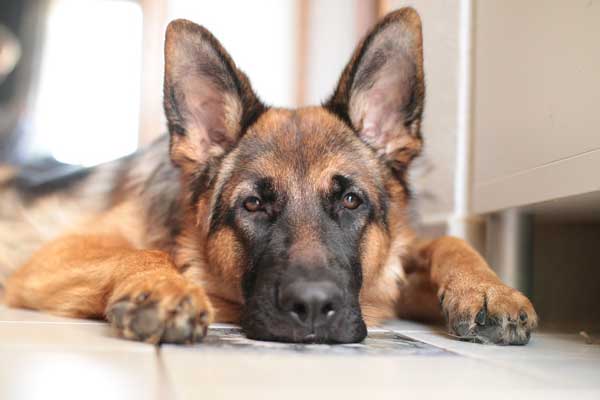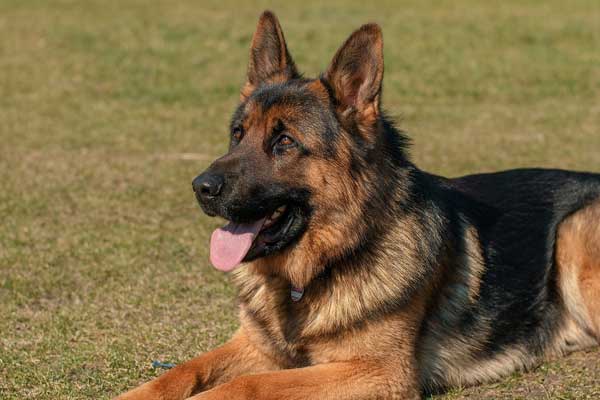Why Do German Shepherds Whine? Unravelling the Mystery Behind
If you have ever owned a German Shepherd, you’re probably all too familiar with the sound of their signature high-pitched whining.
It can be annoying, but it’s essential to understand why German Shepherds whine. By understanding why they whine, you can take steps to reduce the whining and make it easier to live with your furry companion.
Let’s examine why German Shepherds whine and how to manage it before it becomes a behavior problem.
Introduction to German Shepherds
German Shepherds are an incredibly loyal breed of dog, and they make fantastic family pets. They’re often considered the quintessential family dog for a good reason.
They’re intelligent, obedient, and fiercely loyal to their people. But German Shepherds are also known for their tendency to whine.
This can be frustrating for owners, as it can be challenging to determine why your dog is whining.
Typical Whining Behaviors in German Shepherds
When German Shepherds whine, it is usually in a certain way. They will emit a high-pitched, almost plaintive whine or a low, guttural moan – each has a different meaning.
The high-pitched whine is typically used when the canine wants attention or tries to communicate something. If you’re getting this type of whining, it could mean the dog is hungry or needs to go outside for a potty break.
On the other hand, if your German Shepherd is emitting a low moan or growl, it usually means they are anxious or stressed about something. This type of whine may occur if the dog is in a new or unfamiliar environment or when they feel threatened.
Reasons Why Do German Shepherds Whine
There are many possible reasons why German Shepherds whine. Some of the most common are anxiety and stress, boredom and need for attention, pain and illness, separation anxiety, territoriality and protection, and excessive whining. Let’s take a closer look at each of these potential causes.
Anxiety and Stress
Dogs, like humans, can be anxious or stressed in certain situations. Anxiety and stress in dogs can manifest themselves in many ways, but one of the most common forms is whining.
Loud noises, changes to routine, or the presence of unfamiliar people or animals are frequent triggers of anxiety and stress in dogs.
It’s essential to identify and address any sources of stress to help your pup lead a calm, happy life. After all, ain’t nobody got time for a whiney German Shepherd!
Boredom and Need for Attention
German Shepherds are brilliant dogs renowned for their loyalty, intelligence, and obedience. They require a lot of mental stimulation to stay happy and healthy, as a lack of stimulation can lead to boredom and excessive whining.
To ensure your German Shepherd does not become bored, it is vital to provide them with plenty of toys and activities to keep them engaged.
In addition to providing your German Shepherd with toys, mental stimulation, and activities, showing them love and affection is essential.
As social animals, German Shepherds crave physical contact and need attention from their owners to stay happy. So remember to show your furry friend some extra lovin’! Without enough attention, your dog may become depressed.
Pain and Illness
If you notice your German Shepherd whining, it could be a sign that they are in pain or ill. Other symptoms of discomfort or distress include limping, appetite loss, and behavior changes.
If these symptoms are present, they must be taken to the vet for a check-up. Fortunately, with proper care, most illnesses in German Shepherds can be treated successfully.
However, acting quickly is crucial if you suspect something is wrong. Please don’t wait until it gets worse — your furry friend will thank you for it!
Separation Anxiety
German Shepherds are one of the most loyal and intelligent breeds of dogs, renowned for their impressive protective instincts.
However, some German Shepherds can suffer from a condition known as separation anxiety which can manifest itself in many ways.
A common symptom is whining or howling when their owner is not around – indicating that they struggle to cope without their beloved human companion.
This can be a distressing behavior for the dog and the owner, so it’s essential to recognize the signs early and figure out how to help your pup deal with being apart.
Territoriality and Protection
German Shepherds are natural protectors, and they can become very territorial. If you notice your German Shepherd whining when someone new approaches, it could be because they are trying to protect you or their home.
If this is the case, it’s crucial to ensure your dog is correctly socialized and trained so they understand that it’s not necessary to protect their home from every stranger.
Excessive Whining
Many German Shepherds can develop a habit of excessive whining that can irritate owners. This behavior is often caused by boredom, anxiety, or simply seeking attention.
Identifying the cause of your German Shepherd’s whining is the first step to solving the issue. If they are anxious, try making them feel more secure by providing a safe space in your home or providing extra cuddles and reassurance.
If boredom is to blame, provide interesting toys or activities that help occupy their time and stimulate their mind. Providing consistent training and socialization is crucial to reduce excessive whining in German Shepherds.
How to Avoid and Reduce Excessive Whining
If your German Shepherd is exhibiting excessive whining, there are a few things you can do to reduce it.
First, make sure your dog is getting enough exercise and mental stimulation. Exercise can help reduce anxiety and stress, while mental stimulation can help keep them from getting bored.
Giving your German Shepherd plenty of attention is also essential, as this can help reduce their need to whine for attention. If you’re leaving your dog alone for long periods, try providing them with an interactive toy or puzzle to keep them occupied.
Finally, if your German Shepherd is exhibiting excessive whining, it’s crucial to establish boundaries and rules.
Ensure you consistently follow your commands and rewards, not reward your dog for whining. You can help your German Shepherd learn to stop excessive whining with patience and consistency.
Why are German Shepherds vocal?
German Shepherds are a breed of working dogs known for vocalization. They were bred specifically for herding and guarding livestock, requiring an expressive and articulate canine.
Shepherds naturally tend to be very communicative with their human family and other animals. They are also naturally alert and have a strong protective instinct, which makes them good watchdogs.
The breed’s vocalization is okay. It can be used to your advantage because it helps you track where your dog is at all times and alerts you if something suspicious is in the area.
It is important to remember that while vocalizing is natural for this breed, it should be managed appropriately and discouraged if it becomes excessive or inappropriate.
Conclusion
Whining is natural for German Shepherds but can be frustrating for owners. By understanding the potential causes of why German Shepherds whine, you can take steps to reduce the behavior and make it easier to live with your four-legged companion.
With patience and consistency, you can help your German Shepherd learn to stop excessive whining and enjoy a happy, peaceful life with you.








